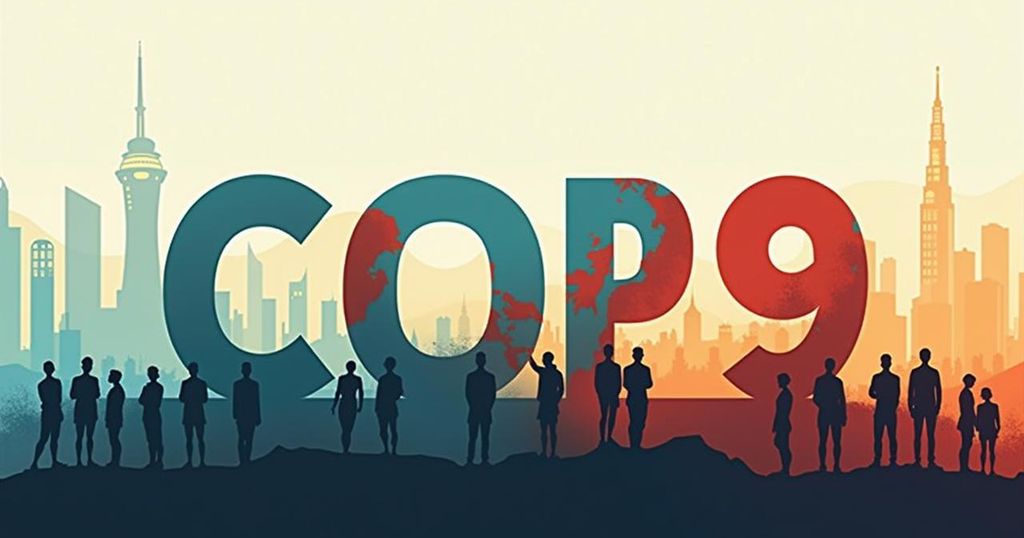Azerbaijan Raises Geopolitical Stakes at COP29

Azerbaijan is leveraging COP29 in Baku to address grievances with France by funding delegates from small island developing states. This support is positioned as a commitment to inclusivity in climate discussions, but is also seen as an antagonistic move toward France, particularly regarding their mutual tensions from the Nagorno-Karabakh conflict.
Azerbaijan is strategically utilizing the upcoming COP29 climate conference in Baku as a platform to address its geopolitical grievances with France. Azerbaijani President Ilham Aliyev has made a commitment to financially support the participation of delegates from small island developing states at the conference, a move believed to have ties to France’s influence in the region. This initiative will cover travel expenses and accommodations for up to four representatives from each participating island nation. This funding pledge follows Aliyev’s earlier proposal to establish a dedicated fund aimed at assisting these nations in tackling climate change impacts. Azerbaijani officials have framed this initiative as a rallying cry for inclusivity, asserting the necessity to include voices from those most susceptible to the effects of climate change. “We will not have an inclusive process [at COP29] if we do not take every measure to ensure participation from frontline communities,” stated Mukhtar Babayev, Azerbaijan’s Ecology Minister and COP29 President-designate. He emphasized the moral responsibility to aid these vulnerable nations. However, some analysts detect ulterior motives in this approach, suggesting that it serves to irk French President Emmanuel Macron, with whom Aliyev has had an ongoing dispute. This discord can be traced back to tensions following the Nagorno-Karabakh conflict, where France has consistently supported Armenia’s position, exacerbating tensions with Azerbaijan. As the host of COP29, Aliyev’s support for island nation representatives could be perceived as an attempt to undermine France’s diplomatic standing. Furthermore, the Azerbaijani administration has accused Paris of engaging in “neo-colonial” behavior, especially in relation to the Pacific region. With tensions still high, this funding initiative appears to be an extension of Azerbaijan’s efforts to counter France’s influence. In recent interactions at the UN General Assembly, this strained relationship was reiterated, with Macron advocating for Armenia’s peace negotiations, while Azerbaijan’s officials criticized France’s stance as unconstructive. During the assembly, Babayev also highlighted the importance of environmental issues concerning small island states, reinforcing Azerbaijan’s commitment to global climate action.
The geopolitical landscape surrounding Azerbaijan and France has been notably heightened due to the ongoing tensions from the Nagorno-Karabakh conflict. France’s support for Armenia in this dispute has led to serious strains in Franco-Azerbaijani relations, with accusations of intervention and neo-colonialism being exchanged. In this context, Azerbaijan’s hosting of COP29 represents not only an opportunity to influence global climate discussions but also to elevate its geopolitical standing at France’s expense, particularly through the engagement of small island nations that might hold historical connections to France. The emphasis on climate action has been a critical part of Azerbaijan’s strategy to showcase its commitment to international cooperation, despite underlying competitive dynamics with France.
In summary, Azerbaijan’s initiative to fund small island developing states’ participation in COP29 is a multifaceted strategy intertwining genuine support for climate action with a calculated move to challenge France’s influence in the region. The geopolitical motivations underpinning this pledge reveal the complexities of international relations, where environmental conferences can serve as battlegrounds for broader diplomatic disputes. The outcomes of COP29 may further define Azerbaijan’s relationship with France and impact regional alliances as both nations navigate their conflicting interests.
Original Source: eurasianet.org








